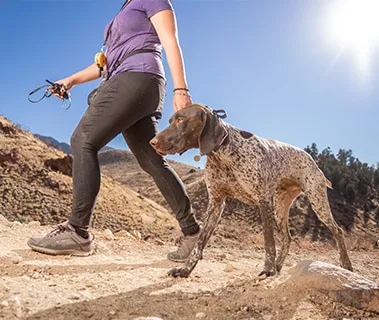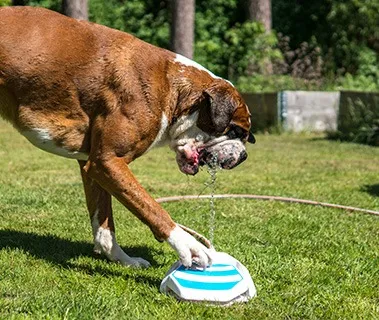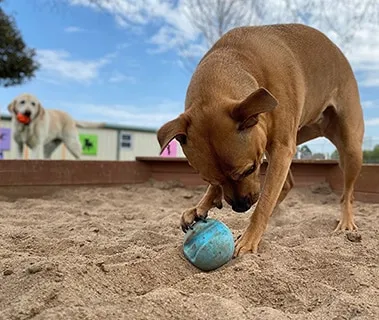As the warmer months arrive, many homeowners eagerly begin revitalizing their outdoor spaces. Garden beds blossom, trees are meticulously shaped, and lawns are perfectly manicured. This effort yields a beautiful yard, but one common canine behavior can quickly undermine all that hard work: dogs digging. Whether they’re creating unsightly holes or attempting to escape, knowing How To Stop Dogs From Digging Out is a crucial skill for any dog owner seeking to protect their landscape and ensure their pet’s safety. While it might seem like an ingrained instinct, it is entirely possible to train your dog to curb this destructive habit with patience, understanding, and effective strategies.
Why Do Dogs Dig? Understanding the Canine Impulse
Dogs often dig in yards for a variety of reasons, which can range from playful exploration to primal instincts. They might be searching for something to play with or eat, trying to bury a favorite toy or bone, foraging for interesting scents or hidden critters, or simply attempting to cool down by reaching the cooler soil beneath the surface. Identifying the root cause of your dog’s digging behavior is the first step toward finding a lasting solution. By addressing their underlying needs and providing appropriate outlets, you can redirect their energy and prevent them from damaging your yard. For instance, ensuring your dog gets enough mental and physical stimulation can also help how to get puppy to go on walks without issues, reducing other unwanted behaviors.
5 Effective Strategies to Stop Your Dog from Digging Out
 Happy dog hiking with owner to release energy and prevent digging1. Ensure Adequate Exercise and Mental Stimulation
Happy dog hiking with owner to release energy and prevent digging1. Ensure Adequate Exercise and Mental Stimulation
One of the most common reasons dogs dig is an abundance of pent-up energy. If your dog consistently digs in the yard, it might be a clear signal that they need more physical activity and mental engagement. Regular walks, invigorating hikes, or active play sessions can help them burn off excess energy. On days when the weather is too hot for outdoor excursions, engaging your dog with indoor games or practicing new obedience commands can be equally effective. A tired dog is often a well-behaved dog, meaning they are less likely to resort to digging as an outlet for their energy. Remember, a vigorous walk can also be a great opportunity to practice how to stop dogs from pulling when walking, promoting overall good behavior.
 Dog drinking from an outdoor water fountain to stay cool and avoid digging2. Provide Ways for Your Dog to Stay Cool
Dog drinking from an outdoor water fountain to stay cool and avoid digging2. Provide Ways for Your Dog to Stay Cool
During hot weather, dogs may dig to escape the heat. The soil just beneath the surface is often cooler than the ambient air, offering a welcome respite. If you notice your dog digging primarily when temperatures rise, ensure they have ample access to water and shade. Consider installing a sunshade, placing a doghouse in a strategic spot, or investing in an elevated dog cot with a cover.
A kiddie pool can also be a fantastic way for your dog to cool off and doubles as a fun activity. And, of course, always make sure they have plenty of fresh, cool water available. Outdoor dog water fountains can encourage hydration and provide a source of entertainment. By offering sufficient cooling options, you can eliminate this common motivation for digging.
 Dog happily digging in a designated digging pit with hidden toys3. Offer Engaging Alternatives and a Designated Digging Zone
Dog happily digging in a designated digging pit with hidden toys3. Offer Engaging Alternatives and a Designated Digging Zone
Dogs often resort to digging when they are bored or seeking entertainment. You can prevent unwanted digging by providing a variety of stimulating toys, bones, and treat puzzle toys. Filling a Kong with peanut butter or frozen yogurt can keep your dog occupied for extended periods, especially during warmer months.
An excellent long-term solution is to create a specific “dig pit” in your yard where digging is encouraged. Fill this designated area with sand or loose soil and bury treats, bones, and toys for your dog to discover. Whenever you see your dog attempting to dig elsewhere, gently redirect them to their designated pit. By giving your dog an acceptable outlet for their natural digging instinct, you fulfill their need to dig without sacrificing your garden. This strategy helps manage other common canine behaviors, much like knowing how to train puppy to stop jumping up teaches them appropriate interactions.
 Bag of Nature's Mace dog repellent, a digging deterrent4. Implement Digging Deterrents in Problem Areas
Bag of Nature's Mace dog repellent, a digging deterrent4. Implement Digging Deterrents in Problem Areas
To protect specific areas of your yard, you can apply deterrents where your dog frequently digs. Covering these spots with large, flat stones, heavy rocks, or even buried metal netting or chicken wire can make them less appealing.
Natural deterrents such as cayenne pepper, citrus peels, or diluted vinegar can also be sprinkled on affected areas, as many dogs dislike these scents and tastes. Commercial dog repellents, like Nature’s Mace, are also available and have proven effective for some owners. Additionally, planting thorny or spiky bushes and plants in vulnerable areas can create a physical barrier, deterring your dog from digging near valuable plants or trees. By making these spots less inviting, you can redirect your dog’s digging efforts elsewhere.
 Professional dog trainer working with a dog during an in-home training session5. Seek Professional In-Home Training
Professional dog trainer working with a dog during an in-home training session5. Seek Professional In-Home Training
If you’ve tried various methods and are still struggling to get your dog to stop digging in specific areas, it might be time to enlist the help of a professional dog trainer. In-home training programs are particularly beneficial as they allow trainers to observe and address your dog’s behavior in the environment where it occurs most frequently – your home and yard.
Expert trainers can assess your dog’s specific motivations for digging and develop a customized training plan tailored to their needs and temperament. They will work closely with you and your dog, providing guidance and techniques to correct unwanted behaviors and foster positive habits. Professional intervention can not only curb digging but also address other behavioral issues your dog might exhibit, such as how to stop your dog jumping up people, strengthening the overall bond between you and your pet.
By understanding why your dog digs and implementing these strategic tips, you can transform your yard into a safe, beautiful space while nurturing a well-behaved and happy canine companion. Professional guidance offers an invaluable resource, ensuring your efforts lead to lasting positive changes.


 Dog drinking from an outdoor water fountain to stay cool and avoid digging2. Provide Ways for Your Dog to Stay Cool
Dog drinking from an outdoor water fountain to stay cool and avoid digging2. Provide Ways for Your Dog to Stay Cool Dog happily digging in a designated digging pit with hidden toys3. Offer Engaging Alternatives and a Designated Digging Zone
Dog happily digging in a designated digging pit with hidden toys3. Offer Engaging Alternatives and a Designated Digging Zone Bag of Nature's Mace dog repellent, a digging deterrent4. Implement Digging Deterrents in Problem Areas
Bag of Nature's Mace dog repellent, a digging deterrent4. Implement Digging Deterrents in Problem Areas Professional dog trainer working with a dog during an in-home training session5. Seek Professional In-Home Training
Professional dog trainer working with a dog during an in-home training session5. Seek Professional In-Home Training